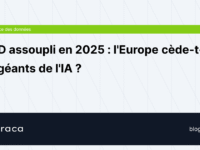Publié : 25 November 2025
Actualisé : 11 hours ago
Fiabilité : ✓ Sources vérifiées
Je mets à jour cet article dès que de nouvelles informations sont disponibles.
📋 Table of Contents
Imagine for a moment: Europe, often seen as the guardian of our digital freedoms, faces a major dilemma. On one side, its ambition to become a key player in artificial intelligence. On the other, its historical commitment to protecting our personal data. What if, to catch up in the AI race, it’s willing to make concessions on the latter? This is the burning question raised by the European Commission’s new project, a real thunderclap in the tech world.
For years, the General Data Protection Regulation (GDPR) has been our digital shield. It forced tech giants to rethink their approach, to respect our privacy or face colossal fines. But now, AI has arrived. And with it, the urgent need not to be left behind by the United States and China, which already dominate this new technological Wild West. Europe has tried to create its own champions, but success has been elusive. So, should rules be relaxed to unleash innovation? That’s the risky bet the Commission seems willing to take.
🚀 The “Digital Omnibus” and the AI Awakening
The European Commission has just unveiled a project dubbed the “digital omnibus.” Behind this somewhat barbaric name lies a clear desire: to simplify, accelerate, and innovate. The idea is to allow companies, big and small, to spend less time navigating administrative labyrinths and more time creating. A laudable goal, but one that comes at a price, especially when it comes to artificial intelligence.
The most striking point concerns the AI Act, this historic European legislation intended to regulate AI, particularly so-called “high-risk” models. These systems touch sensitive areas such as health, transport, biometrics, or even predictive policing. Originally, companies were supposed to be compliant by August 2026. But surprise: this deadline has been pushed back to December 2027. Almost a year and a half of reprieve!
The key takeaway: Europe is delaying the application of the strictest AI Act rules for “high-risk” AI systems by almost a year and a half, offering valuable breathing room for companies.
🛡️ GDPR: Shield or Innovation Brake?
And what about GDPR in all this? This text, considered the most protective in the world for personal data, could also undergo a facelift. The idea is to remove certain data from the strict GDPR framework, especially so-called “pseudonymised” data. In plain terms, information that has been processed in such a way that it can no longer directly identify an individual. This data could then be used to train artificial intelligence models, without the explicit consent of internet users.
Of course, “sensitive” data (sexual orientation, political or religious opinions) would remain protected. But a small yet powerful asterisk still qualifies the picture: AI developers could, under certain conditions of “legitimate interest,” process personal data without asking for our opinion. A potentially huge loophole for privacy advocates.
Important: “Pseudonymised” data (which can no longer directly identify an individual) could be used for AI training without consent, unlike “sensitive” data which remains protected. However, a “legitimate interest” clause could allow exceptions.
🍪 Digital Comfort vs. Privacy: The Grand Trade-off
This initiative is, of course, not met with unanimous approval. American tech giants, who have long criticized European rigidity, are rubbing their hands. But privacy advocacy organizations, such as Austria’s Noyb, are crying foul. They see it as a “blank check [to AI companies] to suck up Europeans’ personal data.”
A blank check [to AI companies] to suck up Europeans’ personal data.
However, it’s not all doom and gloom. The project also promises a small revolution for our daily comfort: cookie management. No more endless banners to accept or refuse on every visit! Our preferences could soon be managed directly at the browser level and saved for six months. Fewer clicks, more fluidity, but also, potentially, a slightly less private web. A compromise, in short, between user experience and data protection.
🤔 Europe Facing its AI Destiny
So, is Europe selling off our data to catch the AI train? It’s a delicate balance that the Commission is trying to strike. On one hand, the need to stimulate innovation and create a competitive AI ecosystem. On the other, the desire to preserve the fundamental rights of its citizens. This “digital omnibus” is a bold attempt to reconcile these two worlds, but it inevitably raises profound questions about the future of our privacy in the age of artificial intelligence.
The debate is far from over, and the coming months will be decisive in determining whether Europe succeeds in its gamble without sacrificing its values.
| Area | Old Rule | Proposed New Rule | Impact |
|---|---|---|---|
| AI Act (High-Risk AI) | Compliance by August 2026 | Compliance by December 2027 | More time for innovation, less regulatory pressure. |
| GDPR (Pseudonymised Data) | Subject to explicit consent | Usable for AI training without consent | Facilitates data access for AI, concerns privacy advocates. |
| Cookie Consent | Managed site by site | Managed at browser level (6 months) | Improves user comfort, potentially less individual control. |
















0 Comments